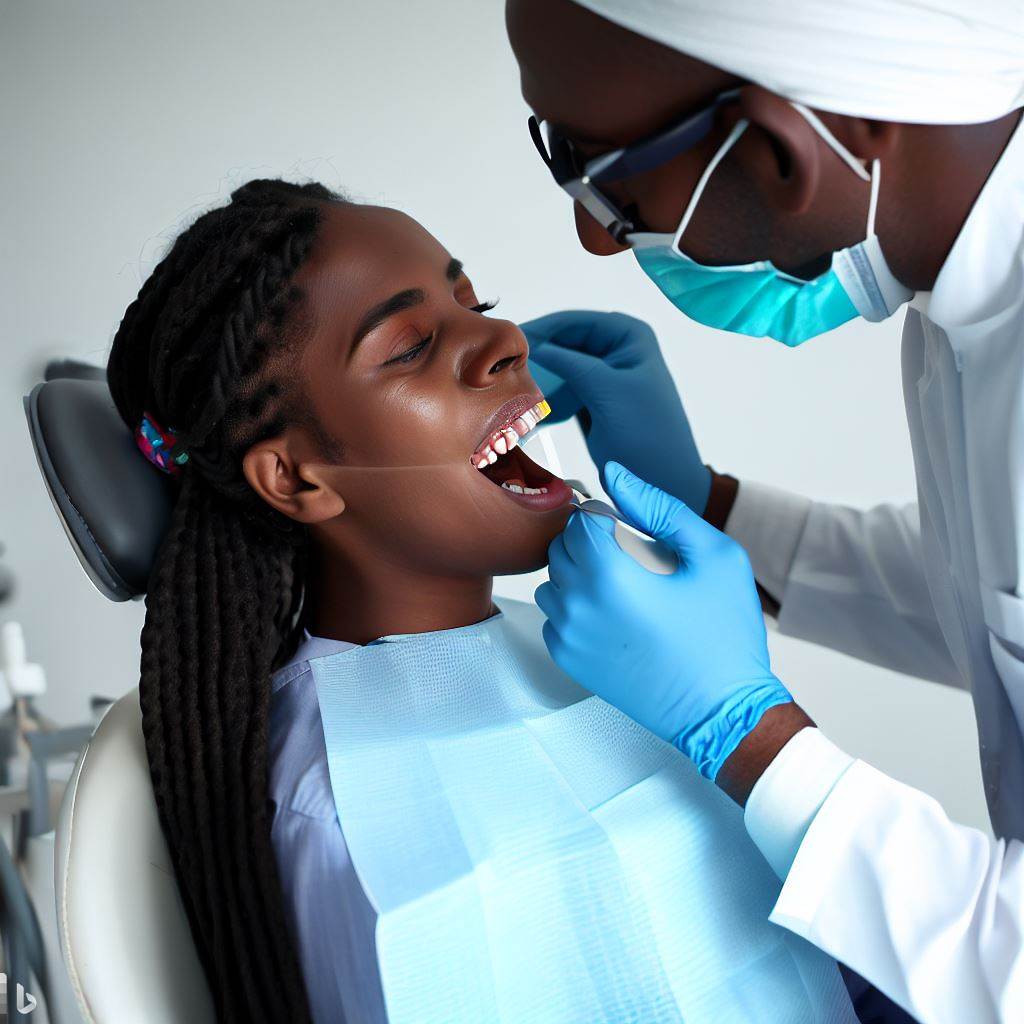Introduction
The dental industry in Nigeria plays a crucial role in maintaining oral health and overall well-being. Dental practices in the country are essential in providing quality dental care services to the population.
Brief overview of the dental industry in Nigeria
In Nigeria, the dental industry is composed of various dental practices, including private clinics, public hospitals, and dental schools.
These practices are responsible for diagnosing, treating, and preventing dental issues.
Importance of dental practices in maintaining oral health
Dental practices in Nigeria play a significant role in promoting oral health and preventing dental diseases such as tooth decay, gum problems, and oral infections. These practices offer a range of services, including routine check-ups, cleanings, fillings, extractions, and restorative treatments. Regular dental visits are essential for early detection and treatment of dental problems, ensuring optimal oral health.
Dental practices also educate patients on proper oral hygiene practices, emphasizing the importance of regular brushing, flossing, and a healthy diet. Oral health is closely linked to overall health, with strong connections to heart disease, diabetes, and other systemic conditions.
Therefore, dental practices in Nigeria contribute to overall wellness and a healthier population. The dental industry in Nigeria is vital in maintaining oral health and improving overall well-being.
Dental practices offer a wide range of services, ensuring early detection and treatment of dental issues and encouraging proper oral hygiene practices. Through these efforts, the industry plays a crucial role in promoting oral health and improving the overall health of the population.
Overview of Dental Practices in Nigeria
Dental practices in Nigeria are essential healthcare facilities that provide oral care and treatment to individuals across the country.
Types of Dental Practices
There are three main types of dental practices in Nigeria:
- Private practices: These are dental clinics owned and operated by individual dentists or dental groups.
- Public/government dental clinics: These practices are run by the government and offer oral health services to the general public.
- Dental hospitals: These facilities are larger and provide more comprehensive dental care, including surgeries and specialized treatments.
Licensing and Regulatory Bodies
The dental profession in Nigeria is regulated by two main bodies:
- Nigerian Dental Association (NDA): The NDA is responsible for overseeing the professional conduct and development of dentists in Nigeria.
- Dental and Medical Council of Nigeria (DMCN): The DMCN is in charge of licensing and regulating dental and medical practitioners in the country.
Challenges Faced by Dental Practices in Nigeria
Dental practices in Nigeria encounter several challenges that affect their operations and service delivery:
- Lack of adequate infrastructure: Many dental practices lack modern equipment, dental chairs, and proper facilities, hindering optimal patient care.
- Shortage of skilled dental professionals: There is a scarcity of well-trained and experienced dentists in Nigeria, limiting the availability of quality oral healthcare.
In review, dental practices in Nigeria play a crucial role in ensuring oral health and well-being amongst its population. The different types of practices, including private clinics, public dental clinics, and dental hospitals, cater to the diverse needs of patients.
Despite challenges such as inadequate infrastructure and a shortage of skilled professionals, organizations like the Nigerian Dental Association and the Dental and Medical Council of Nigeria regulate the sector and work towards improving dental services in the country.
Read: Impact of Health Policies on Dentistry in Nigeria
Dental Services Offered
Dental services offered in Nigeria encompass a range of treatments and procedures designed to promote oral health and enhance smiles.
These services can be broadly categorized into general dentistry, specialized dentistry, and cosmetic dentistry.
General Dentistry
- Routine check-ups and cleanings: Regular dental visits help detect and prevent oral health issues.
- Fillings, extractions, and root canals: These procedures repair damaged teeth and alleviate pain.
Specialized Dentistry
- Orthodontics (braces): Straightening misaligned teeth and correcting bite issues for improved function and aesthetics.
- Periodontics (gum disease treatment): Diagnosis and treatment of gum diseases to maintain healthy gums and prevent tooth loss.
- Oral surgery: Surgical interventions performed by oral surgeons to address complex dental conditions.
Cosmetic Dentistry
- Teeth whitening: Professional whitening procedures that remove stains and enhance the shade of natural teeth.
- Dental veneers: Thin porcelain shells bonded to the front of teeth to enhance their appearance, shape, and alignment.
- Dental implants: Artificial tooth roots surgically placed into the jawbone to replace missing teeth.
Dental practices in Nigeria offer a variety of services to meet dental needs. General dentistry focuses on routine check-ups, cleanings, and restorative procedures like fillings and extractions. It aims to maintain healthy teeth and address dental issues such as cavities.
Specialized dentistry deals with complex concerns. Orthodontics, known as braces, corrects misaligned teeth and bite problems using braces or aligners.
Periodontics diagnoses and treats gum diseases like gingivitis and periodontitis, preventing gum recession and tooth loss. Regular dental visits and early intervention are crucial for preventing dental problems and maintaining a lifetime of oral well-being.
Read: Exploring Specialties in Nigerian Dentistry
Dental Practice Operations
Dental practices in Nigeria operate under a set of protocols and procedures to ensure efficient and effective patient care.
In this section, we will explore the key aspects of dental practice operations, including appointment scheduling and patient management, dental equipment and technology, sterilization and infection control, and dental billing and insurance.
Appointment scheduling and patient management
Efficient appointment scheduling is crucial for dental practices to optimize their daily operations. Dental receptionists play a vital role in managing patient appointments and ensuring a smooth flow of patients.
Effective patient management involves timely check-ins, updating records, and providing appropriate guidance and support. Digital systems and software, like electronic health records and dental practice management software, assist in streamlining the appointment scheduling and patient management processes.
Dental equipment and technology
Dental practices rely extensively on specialized equipment and technology to carry out various procedures.
Modern dental practices in Nigeria utilize advanced technologies for accurate diagnoses and more efficient treatments. Equipment such as dental chairs, X-ray machines, dental lasers, and dental CAD/CAM systems are standard in dental practices.
Dental professionals regularly update their equipment and undergo training to stay updated with the latest technological advancements.
Sterilization and infection control
Proper sterilization and infection control protocols are paramount in dental practices to ensure patient safety.
Dental clinics follow strict guidelines formulated by regulatory bodies to maintain high standards of sterilization and infection control. Autoclaves, disinfectants, personal protective equipment, and proper waste disposal are essential components of sterilization practices.
Regular training and education of dental staff on infection control protocols safeguard both patients and dental professionals.
Dental billing and insurance
The dental billing and insurance procedures revolve around effectively handling patient accounts, precisely recording treatments, and efficiently processing insurance claims. Dental practices utilize specialized software for efficient billing and accounting, reducing administrative errors and improving financial management.
Accurate understanding of dental insurance policies and regulations enables dental practices to accurately bill patients and insurance companies. Engagement with patients regarding payment options and insurance coverage helps maintain transparency and ensure seamless financial transactions.
In general, dental practice operations in Nigeria encompass appointment scheduling and patient management, utilization of dental equipment and technology, sterilization and infection control practices, as well as dental billing and insurance processes.
By adhering to these operational aspects, dental practices can provide safe, efficient, and high-quality dental care to patients.
Read: How Nigerian Dietitians Are Combating Malnutrition

Dental Team
The dental team in Nigeria consists of various professionals who play essential roles in providing dental care.
- Dentists and specialists: Dentists are at the forefront of dental practices, responsible for diagnosing and treating oral health issues. Specialists like orthodontists, periodontists, and endodontists provide specialized treatments.
- Dental hygienists: Dental hygienists perform preventive procedures such as teeth cleaning and polishing, along with educating patients about proper oral hygiene practices.
- Dental nurses/technicians: Dental nurses, also known as dental technicians, assist dentists in various procedures, ensuring instruments are sterilized, and patients are comfortable.
- Front desk and administrative staff: These staff members handle scheduling appointments, managing patient records, and handling insurance claims. They also greet patients and handle inquiries.
The dental team in Nigeria collaborates efficiently to provide quality care to patients, utilizing dentists’ and specialists’ expertise for a range of dental conditions. They recommend suitable treatments and perform dental fillings, extractions, and other procedures.
Dental hygienists play a crucial role in preventive care, educating patients about oral hygiene practices and performing fluoride treatments and dental sealants. Dentists collaborate with specialists when specialized care is needed, ensuring a seamless patient experience.
Dental practices in Nigeria adhere to strict infection control protocols, maintaining a clean environment for patient safety and reducing infection risks.
In a nutshell, the dental team comprises dentists, specialists, dental hygienists, dental nurses/technicians, and front desk/administrative staff, working together to deliver comprehensive care and maintain optimal oral health.
Read: Latest Dental Technologies in Nigeria
Patient Experience
Patient Experience in Dental Practices in Nigeria
In dental practices in Nigeria, patient experience is prioritized to ensure patient comfort and satisfaction throughout their journey.
Importance of patient comfort and satisfaction
- Comfortable Environment: Dental practices in Nigeria focus on creating a relaxed and comfortable environment for their patients.
- Pain Management: Dentists prioritize effective pain management techniques to ensure minimal discomfort during procedures.
- Personalized Care: Dental practitioners in Nigeria strive to provide personalized care, addressing individual concerns and needs.
- Clear Communication: Dentists communicate treatment plans and procedures clearly, ensuring patients understand their options and are empowered to make informed decisions.
Communication and education
- Patient Education: Dental practices in Nigeria emphasize patient education to raise awareness about oral hygiene and preventive care.
- Language Barrier: Dentists make efforts to communicate effectively with patients, overcoming language barriers through interpreters.
- Explanations and Instructions: Dentists provide clear explanations and instructions before, during, and after procedures.
Waiting room experience
- Comfortable Waiting Area: Dental practices in Nigeria create inviting waiting areas with comfortable seating and a calming ambiance.
- Kid-Friendly Environment: To accommodate families, waiting areas provide an engaging and child-friendly atmosphere.
- Minimal Waiting Times: Dental clinics try to minimize waiting times by effective scheduling and management.
Post-treatment follow-up
- Monitoring Progress: Dentists in Nigeria emphasize post-treatment follow-up to monitor patients’ progress and ensure successful outcomes.
- Addressing Concerns: Dental practitioners encourage patients to reach out with any concerns or questions after treatment.
- Proactive Approach: Dentists aim to proactively address any post-treatment complications to provide prompt and effective solutions.
Essentially, dental practices in Nigeria prioritize patient experience by focusing on comfort, effective communication, education, waiting room experience, and post-treatment follow-up.
By providing personalized care and creating a positive environment, dental practitioners aim to ensure the satisfaction and well-being of their patients.
Promoting Dental Practices in Nigeria
Dental practices in Nigeria face the challenge of promoting their services and attracting patients. To overcome this obstacle, they utilize various marketing and advertising strategies.
- Marketing and advertising strategies: Dental practices employ a variety of methods to market their services, including traditional advertising through billboards, radio, and television.
- Social media presence: In the digital age, dental practices leverage social media platforms to reach a wider audience.
They create engaging content and share information about their services to attract potential patients. - Community outreach programs: Dental practices in Nigeria conduct community outreach programs to educate the public about oral health.
They visit schools, community centers, and other public spaces to provide free dental check-ups and oral hygiene education. - Patient referrals: Satisfied patients are the best advocates for dental practices.
They refer family, friends, and colleagues to the dental practice, increasing its visibility and credibility within the community.
By implementing these strategies, dental practices in Nigeria can effectively promote their services and expand their patient base.
Read: The Journey to Becoming a Registered Nurse in Nigeria
You Might Also Like: Healthcare Reforms: A New Era for Doctors in Nigeria
Conclusion
This section has highlighted the operations of dental practices in Nigeria. We have discussed the importance of regular dental care and the need for individuals to prioritize oral health.
Overall, it is crucial for everyone to pay attention to their oral health and seek regular dental check-ups to maintain good oral hygiene. Remember, a healthy smile leads to a healthy life.
Dental hygienists play a crucial role in preventive care, educating patients about oral hygiene practices and performing fluoride treatments and dental sealants.
Dentists collaborate with specialists when specialized care is needed, ensuring a seamless patient experience.
Dental practices in Nigeria adhere to strict infection control protocols, maintaining a clean environment for patient safety and reducing infection risks.




